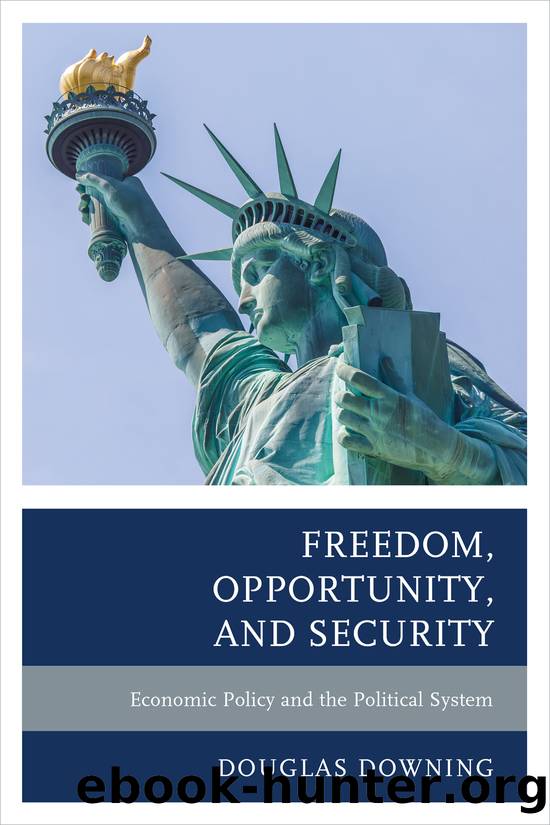Freedom, Opportunity, and Security by Downing Douglas;

Author:Downing, Douglas;
Language: eng
Format: epub
Publisher: Lexington Books
Banks make their living by making loans, so normally they will only hold as many non-loan assets, or reserves, as the government requires them to do so (with the required reserve ratio). Suddenly the situation changed with the 2008 financial crisis. âOver-borrowed firms and households are reducing their spending to reduce their debts just at the moment when banks are engaged in restoring their balance sheets by reducing their loans.â42 When lenders lack confidence that they will be paid back, the economy suffers from a shortage of credit.43
Prior to 2008 the Federal Reserve paid no interest on the reserve deposits that banks were required to hold with the Fed. Once they started paying interest one result was that bank reserves skyrocketed to way more than was required (see online graphs). If the Federal Reserve did not pay interest on reserves held over the minimum required amount it would provide more of an incentive for banks to increase lending rather than hoard excess reserves.
Eliminating the FMs, making it voluntary for a bond to be rated by the bond raters, replacing the risk-based bank capital standards with a plain minimum capital ratio, and reducing the size of the âtoo big to failâ institutions would also help reduce the risk. Even more importantly, providing for policies for greater macroeconomic stability would reduce uncertainty in the economy and reduce the risk of crises (see the next chapter).
Notes
1. Nobody would willingly sell either gold or silver at a price below its official price, because people had the free coinage option, which was the equivalent of selling the metal to the mint at the official price.
2. Galbraith, Money, p100 and related pages cover this history.
3. A new political party, the greenback party, came into existence to press for the continued issuance of greenbacks. They elected 14 members of the House in 1878 (Galbraith, Money, p106).
4. Galbraith, Money, p113.
5. Hamlet, act I, scene 3, line 75.
6. The bank run in the movie happened during the depression. Krugman (2012, p59) apparently does not understand the flashback structure of the movie when he thinks the run is anachronistically set after World War II.
7. Kindleberger reviews a history of financial crises and the role of a lender of last resort.
8. Friedman, chapter 3.
9. see Taylor, p47.
10. Keynes had previously been involved at the Versailles conference after World War I, and issued a prescient warning about the damaging effects of the reparations the victors imposed on Germany. (Economic Consequences of the Peace).
11. Note that maintaining full employment does not mean that all jobs need to be preserved as they are. As pushbutton elevators became common, society no longer needed workers with the skill to operate an elevator control lever. These workers can be employed in more productive jobs, but the transition of workers from one job to another can be traumatic for the workers and costly for society.
12. Samuelson.
13. In 2012, Krugman (p59) wrote that the âsystem worked pretty wellâ up until the early 1980s. Back in 1994 Krugman did remember that inflation was driving many savings and loan associations toward bankruptcy in the 1970s.
Download
This site does not store any files on its server. We only index and link to content provided by other sites. Please contact the content providers to delete copyright contents if any and email us, we'll remove relevant links or contents immediately.
International Integration of the Brazilian Economy by Elias C. Grivoyannis(57387)
The Radium Girls by Kate Moore(10915)
Turbulence by E. J. Noyes(7057)
Nudge - Improving Decisions about Health, Wealth, and Happiness by Thaler Sunstein(6642)
The Black Swan by Nassim Nicholas Taleb(6203)
Pioneering Portfolio Management by David F. Swensen(5615)
Rich Dad Poor Dad by Robert T. Kiyosaki(5162)
Zero to One by Peter Thiel(4834)
Man-made Catastrophes and Risk Information Concealment by Dmitry Chernov & Didier Sornette(4748)
Secrecy World by Jake Bernstein(3788)
Millionaire: The Philanderer, Gambler, and Duelist Who Invented Modern Finance by Janet Gleeson(3575)
Skin in the Game by Nassim Nicholas Taleb(3477)
The Age of Surveillance Capitalism by Shoshana Zuboff(3431)
The Money Culture by Michael Lewis(3291)
Skin in the Game: Hidden Asymmetries in Daily Life by Nassim Nicholas Taleb(3271)
Bullshit Jobs by David Graeber(3190)
The Dhandho Investor by Mohnish Pabrai(3175)
The Wisdom of Finance by Mihir Desai(3086)
Blockchain Basics by Daniel Drescher(2895)
